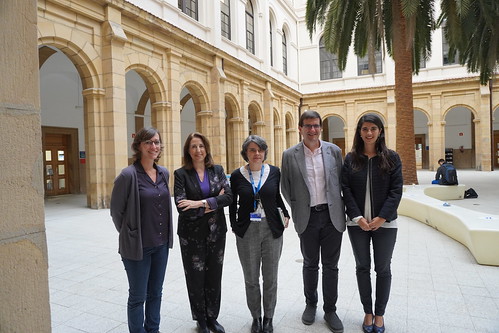28 September 2022
Bilbao Campus
Since the first student networks against harassment in universities were born in the United States, the movements we know today as MeToo have continued to grow and spread. Among these initiatives is "Metoo Universidad en ruta", which aims to raise awareness of the problem throughout the country, especially among first-year students starting university this month. As several survivors from various national and international university campuses have already done, "breaking the silence is the best form of prevention and action on the part of the entire university community".
In this regard, several victims involved in the MeToo University travelled on two parallel routes between 26 and 30 September. One route left Barcelona on 27 September heading for the Northern universities, and made a stop at the University of Deusto on 28 September. The other route left Valencia on the 26th, passing through some of the main universities in the south. The two routes will meet on the afternoon of the 30th at a main event in Madrid, which will bring together the rectors of the country's universities as well as the media.
Metoo at Deusto
The Vice-Rector for University Community and Agenda 2030, Juan José Etxebarria, opened the event at Deusto explaining the journey of MeToo University, the importance of this network and these events to prevent and eradicate gender-based violence in the university environment. Deusto's institutional commitment to equality and the eradication of sexual harassment. Then, Gema Tomás, Dean of the Faculty of Law, introduced the speakers: Ana Vidu, Marie Sklodowska-Curie researcher at the University of Berkeley and the University of Deusto, co-founder of the Metoo University movement and the first victim to denounce one of the most recidivist professors in Spanish universities for sexual harassment.
The press echoed the case and the isolating gender-based violence suffered by those who supported her, including the documentary "Voces contra el silencio" (RTVE Documentos TV), winner of the Golden Globe at the World Media Festival in Hamburg 2018. As Dean Tomás explained, "We at the University of Deusto would like to inform about MeToo University, but also to show our solidarity with it and with all the victims, and raise our voice so that the silence suffered by the victims gives way to active condemnation."
She then introduced Dolores Morondo, researcher of the "Pedro Arrupe" team and Director of the Master‘s in Human Rights Policies and Practice, and Laia Tarragona, Executive Coordinator of the "Gearing Roles" project and researcher of "Resistiré.” Dolores Morondo spoke about instruments such as the protocols for prevention, evaluation and action in situations of harassment at the University of Deusto and the right to live in spaces free of violence. In turn, Laia Tarragona explained the current third equality plan at the University of Deusto, which has 63 actions in different areas. It aims to prevent and eliminate sexual harassment at the university by making the university a safe environment for all people.
Finally, Ana Vidu thanked the University of Deusto for organising this event, which is in fact a positioning in favour of "MeToo University" and against sexual harassment. This support is also provided by the best universities worldwide. She also highlighted the role that the University of Deusto always played when she came from the University of Barcelona, a centre where she and other people - who created the solidarity network that today is called MeToo University - denounced cases of harassment by a professor who had been harassing students with total impunity for decades. As an example, she mentioned inviting a student to his house, where he ended up holding his penis, or how he sent pictures of himself naked to students.
It was then that the researcher Vidu decided to break her silence and asked for help. Thus, she and the CREA research group took a stand against such harassment. And with this support, she and 13 other students filed a complaint with the university. She also spoke of the isolating gender violence, involving cruel attacks suffered by all those who supported her (attacks such as death threats at three o'clock in the morning).

